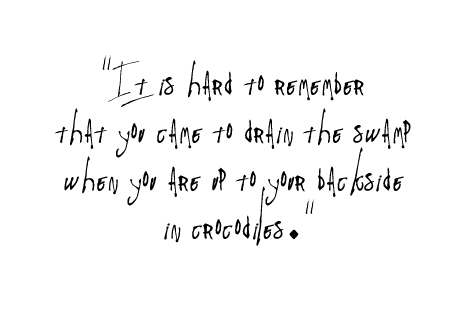This quote…

…(which is unattributed as far as I can tell) is one that caused pause the first time it crossed my brain. My initial reaction to this was in regard to what happens to the early-service teacher upon logging that first real week as leader of their own classroom. Let’s start by making the assumption that even the least-excited first year public school teacher comes to the profession with a measurable amount of idealism. I don’t think there is any doubt about what happens to this focus once the new car smell of the school year wears off.

Characterize
What might these metaphorical “crocodiles” be? Difficult students? Perplexing policies? Wearisome course loads, a dearth of resources, demanding curricula, scarcity of support… oh my? I’d like to see a Venn diagram that would represent the “crocodiles” for teachers against those of school administrators. Not so fast… I’d also like to see this from the student perspective as well. The more I think about this, I’m betting that a diagram of this sort would be rather telling. I’m always of the impression that creating such constructs to forward discussion and debate only helps to clarify the landscape of our issues. I think I just gave myself another assignment. That will have to wait for now, but I’m hoping this post won’t let me forget.
The real question here, in my opinion, isn’t whether or not the endeavor of professional education today is a formidable one. The real question is what do we do to keep our eye on “the swamp?” Once the blinders are off, once you’ve hit that first wall, once the challenge clouds your vision, what do we do to stay focused? I’d be interested in creating a string of advice for teachers or administrators to consult on that first wearisome Monday afternoon when vision seems clouded by the fog of frustration. Care to play along?

Share
Take a few minutes to ponder. Craft your response as a comment below. Share your strategy. It’s possible you haven’t yet identified it. And yet, from what I interpret about the readers of this blog… you do have one. You do something. You think about something. You tell yourself something. You have some way of turning a negative into a positive. You have some way of maintaining your vision in tough times or you wouldn’t likely still be in the learning business… spending time reading blog posts from folks far away yet loosely tied.
You have a way of focusing on the swamp- even when the crocs are waist deep. Help build a set of reminders for our colleagues who will surely one day need them. It is a sad thing to hold onto that kind of advice. Share.
Artwork
*Quote: “It is hard to remember that you came to drain the swamp when you are up to your backside in crocodiles.” by some cool old guy… I wish I knew whom.*Image: Canine Friends/ Vietnam, Mekong River by flydime on Flickr. *Image: 14 More Days by Chris Martino on Flickr (amazing- this could not have fit the post better). .
That is indeed a great quote, Sean. My strategy is not complicated: I think it is important to keep things in perspective. Instead of letting the number of crocodiles in my immediate presence bombard my thinking, I try to move to the 30,000 foot viewpoint and think more globally about how many total crocodiles I’ve come upon in the past week, month, or year. It is all too easy to wallow in sorrow and self-pity when faced with adversity. I’d rather take the other road and figure out if I’m just in a rut, or there really is a problem needing to be addressed. Maybe it’s just my competitive nature causing me to want to fight, but I would rather fight than feel sorry for myself.
I spend a majority of my time working with other leaders, whether they are Principals, Curriculum Coordinators, Instructional Coaches, or other District Office colleagues. I have learned that my “seat on the bus” (to use Jim Collins’ terminology) is to make sure we maintain balance. I work really hard to take situations in their context and then apply them to my own in order to determine how I can help maintain the balance necessary to be a successful organization. There are easy days, and there are hard days.
Then there are days when I fail.
However, if I let a little failure get in the way of doing my job, I’m not really following my own advice then, am I?
I should have known I could have counted on you to deliver the exemplary level-headed response here. Nicely done. Helping to hold the ground steady so that people can make coolheaded decisions seems to be a strength of yours. Excellent addition.
I’m a 4th year teacher–I love the classroom. I love it more now than I did when I started, and I was pretty darn excited when I started.
The classroom is mine. Good things happen in it. Disasters happen, too, but when dealing with humans dancing on the edge of what they know under conditions they cannot control, the occasional disaster is expected.
Administrators are under tremendous pressure, and I get that. I am fortunate to work “under” savvy folks who have enough sense to share why they do what they do, and who give the staff enough leeway to take risks.
I do have a small piece of advice, though–keep your educational philosophy (you have one, no?) within arm’s length for the rare days when you suspect the kids would be better with Attila the Hun than you.
If you are not happy in the classroom itself, get out.
(Oh, by the way, I got the grant–thanks for your help! I am presenting to the BOE March 23rd–I may steal a few of your words, attributed, of course.)
(What’s the worst that can happen? You get fired.)
I appreciate this testament very much. You are quite right… a good classroom is as messy as it is beautiful. It reminds me of the true meaning of “chaos” (and I’m going to try to avoid doing the business-world thing of invoking the word outside of its intended field of thought). That said, there is a certain order inherent within a mess of kids led by a caring adult down a path of learning.
I think most teachers who went the classical route (which is fewer science & math teachers these days) had to write a philosophy statement/paper/treatise at some point. That little pile of words needs to be revisited early and often in service as a teacher. Keeping tabs on how your beliefs are molded by experience and further learning… is a big deal in my opinion. I remember the first time I revisited mine. Over ten years ago I was nominated for an award that required submission of my educational philosophy (among many other things). I still look at that reflective piece as an important bookmark in my career as an educator. I did the same thing again in grad school years later. That too was a valuable experience. Would I have done that on my own… without coaching (or prodding)? I probably wouldn’t have. However, I would likely be sharpened by revisiting that formal philosophy even more often.
“If you are not happy in the classroom itself, get out.” This cannot be said enough. However, here in 2010, the “job” of being a teacher is a rather frighteningly stable position in a very unstable economy.
You did get the grant! Awesome. Borrow anything of mine you wish. I “borrow” your way of looking at the world every time I visit your blog to catch up on the Doyleverse.
Cheers!
I guess I look at this saying with a different set of lenses. I think it is because of the crocodiles we rise to greatness. It is through these periods of difficulty when we grow the most in our personal and professional lives. It is through these seasons we have to sit quite, reflect, and finally ask for help. It is when we are surrounded by crocs we need to be humble and bow on our knees and ask the Lord for assistance in our journey. When we really understand we can do nothing successfully on our own, we then find the doors are flung wide open and help is just around the corner.
The next step is to seek out and allow this help to come your way. You are not alone, because even experienced educators are continually in a swamp with crocs. True educators feel they have been given a gift and they do not take that gift for granted. Serving others is in our blood, whether you are 5 years old or a fellow educator. So I guess what I am alluding to is to seek out help, because 9 chances out of 10 the good Lord has placed someone in your path that will help you through the rough times.
Each year a new configuration of students are placed in our care. No two classes are ever alike and no two lessons ever unfold in the same way. Teaching is fluid and ever changing. That is what makes it so exciting, but frustrating at the same time. One day you can feel like you have traveled for days through a barren lifeless desert and the next day you can feel like you are on top of a mountain way above the clouds. In other words, true accomplishments will never come without the difficulty of crocodiles in our swamps.
As you humble yourself and allow help from above, you will find you are never alone in that swamp. As you look to your right and to your left you will find an educator who has a heart of service and the gift of teaching. Just look around pick up a bucket and drain the swamp as a team.
Thanks a ton, Karen. Paragraph #3 in particular is a wonderful addition here. That’s a pretty nice aesthetic there for what we do day to day… 😉